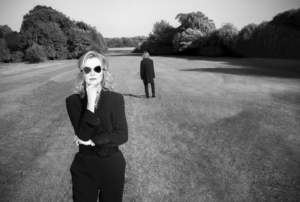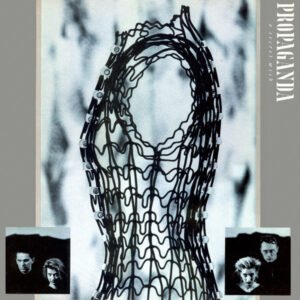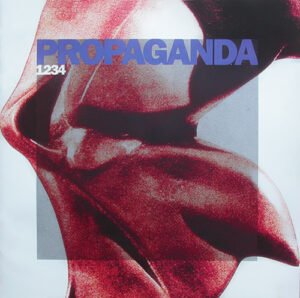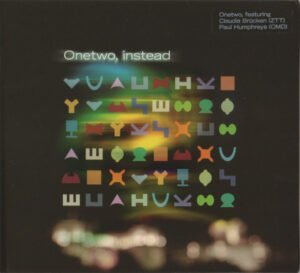The German band Propaganda was one of the flagships of ZTT, one of the labels that defined the music of the eighties. There, they released their first singles and A Secret Wish, an album that combined pop melodies with experimentation, darkness and references to German Wxpressionism. After several line-up changes they split up in 1991 but, to the joy of their fans, Susanne Freytag and Claudia Brücken took up the project again in 2018, first as Duel and now as xPropaganda. They will be one of the highlights of the DarkMad festival to be held between the 11th and 12th of May at the Autocine in Madrid.
Photos: Jimmy King
 —You used to hang out in the now-famous Ratinger Hof in Dusseldorf. How was the atmosphere back in the day? Did you ever meet Robert Görl and Gabi Delgado there? Der Plan and Fehlfarben were also from Dusseldorf, right?
—You used to hang out in the now-famous Ratinger Hof in Dusseldorf. How was the atmosphere back in the day? Did you ever meet Robert Görl and Gabi Delgado there? Der Plan and Fehlfarben were also from Dusseldorf, right?
—Yes, we met them and saw lots of local bands performing there. It was the eighties and it was the end of the punk era. It wasn’t a particularly friendly atmosphere, and we were very young, but it was a place where art and music would meet. It was about music, dancing and live concerts. Ratinger Hof was always a very interesting, cool, edgy place. People would hang out there every week, so you got to know lots of people.
—Claudia and Susanne, you met in Topolinos, an all-female new wave act. The band recorded a song called “Mustafa”, right? How do you remember this, your first musical adventure?
—”Mustafa” was our first song. We used to do backing vocals for local bands and from that Topolinos was formed. We decided to form our own band with Christa Kolbe and Sabine Wolde. It was exciting to create and experiment with other women. It was a playful way of expressing ourselves. A project to escape the grey, mundane day to day life.
—Your first cassette featured a kind of version of Throbbing Gristle’s “Discipline”. Why did you never record it officially later? I guess that recording was an idea of Ralf Dörper who co-founded the (at the time) industrial band Die Krupps?
—Susanne: It was an idea of Ralf Dörper as well as Andreas Thein. I joined when both of them were looking for a vocalist for this project. We didn’t think it was necessary to include it in A Secret Wish.
—Claudia you were an Art student, right? The band has always had a very arty image and approach to music, starting with the reference to Fritz Lang’s classic saga and German Expressionism. Who was responsible for all this approach?
—We all were. The title of Mabuse lend itself to the style of German Expressionism and black and white imagery. It was all our history: Claudia’s reference point was Klaus Nomi (“Cold Song”) and we all shared the musical and cultural background of Marlene Dietrich and Lotte Lenya, Brecht, Weil, John Heartfelt, Fassbinder, etc.
—How do you think that Propaganda career would have gone without signing with ZTT? Do you think it would have continued in a more experimental way?
—It would possibly have been a very different band.
—Getting some info about the band, I read a lot of things about the recording of the first singles and A Secret Wish. In retro sight and not being so young now, do you think that the label was too intrusive or are you grateful for the help they provided?
—We are very grateful for the experience, being able to work with ZTT, being able to work with all these special and creative, wonderful people.
—In an interview you said: “Susanne and I were perceived at the time as easily replaceable and we were only ‘on hire’, so to speak. Which obviously made me and Susanne angry, because we were actually the faces”. Do you think that it was because you were women or the band was considered like a studio thing?
—We thought it was because we were women, but it might have been a combination of both. There was often an underlying subtle tension in the band that was going on. We often felt undermined and not always taken seriously which did not make a good foundation for the longevity of the band.
—Propaganda did a few covers, some of them suggested by ZTT, like “Femme Fatale” and “Sorry for Laughing” (that you have been playing in your concerts). Later, Claudia, you released a full album of covers, entitled Another Language. Which is your favourite cover of all you have done, Claudia? Any that you have felt completely yours?
—Claudia: I very much like the process of interpreting other peoples’ songs and putting my own take across. I have done a lot of covers and it’s hard to pick just one. I’ve always been fond of my interpretations of “Femme Fatale”, “Whispering Pines” (The Band) and Bowie’s “Everyone Says Hi”.
—How did you get the idea of recording the same song Jewel/ Duel in two different styles? Did you want to show the two sides of the band?
—It was Paul Morley’s idea to contrast the pop idea of “Duel” and show a darker industrial side of the song. When Stephen Lipson and Andy Richards were in the studio working on the track, they were thinking of playing a war game against each other.
—What do you think after all these years of Wishful Thinking, the remix album?
—We like it very much. To us it still sounds fresh and exciting.
—Did you play live back in the day? I always read that at the time it was impossible to reproduce your music in a concert.
—We had a drummer, guitarist, bass and keyboards and a lot of sequences running live. In addition, Michael Mertens played marimba and percussions.
—Susanne, how did you feel during the 1234 period? You and Ralf left before the release of the album, but how was the atmosphere in the band then?
—With Claudia not being in Propaganda at the time, the remaining and other musicians were realigning to a new set up of Propaganda. There were conflicts before this new set even began and I fell out with Ralf over the writing process. I did not want to continue. For me, the atmosphere at the time was something I did not want to be a part of. It did not feel right to me.
I changed my mind after some time when the band asked me to do a guest appearance for one song and I agreed. You could call it nostalgia.
—In 1998, Mertens and the two of you started recording songs for a new album? What happened with those songs?
—Those songs were demos and we sent one CD to a record company. This CD somehow leaked onto the internet and then people treated our demos as though it was a finished product.
From the bands’ point of view, it was never meant to be listened to in this unfinished state.
—Claudia, Love: And A Million Other Things was your first solo album. How did you approach it at the time? Did you want to do music far away from Propaganda or just wanted to follow the same direction?
—For my first solo album LAAMOT, I teamed up with the late John Uriel. John lived in Liverpool, so I’d go there a lot to write and compose. It was a completely different vibe and music scene, which suited me very well. I met some fantastic musicians during that period, who would play a couple of gigs with me later on. I called them “the shiver of flowers”. Once all the songs were written, I teamed up with Pascal Gabriel who produced the bulk of the album. We recorded it at the Mayfair Studios in Primrose Hill/ London. It was great to work with Pascal, he was exciting to work with, funny and edgy. We were making dance/pop music and being experimental at the same time. I liked that combination and spirit. The producer Steve Nye worked on 3 other songs of the album, which was very exciting too. His method of production was so different… I learned a lot during that time.
The last thing on my mind was trying to sound like Propaganda, this was me going solo…
—I am a big fan of Thomas Leer, so I have to ask you, Claudia about Act, your project with him. How do you remember collaborating with the composer of the great The Bridge? How do you remember recording Laughter, Tears and Rage, an album really loved by your fans?
—After Ralf, Michael and Susanne took the decision to leave the ZTT label and with me staying on, I felt a little lost as what to do next. Then Thomas approached ZTT and when we were introduced, we hit it off really well and we decided to try and write a few songs together. Thomas lived in close proximity to me, so it was easy to meet up on a daily basis and write and compose in Thomas’s working space. So, Act was born. We were quite theatrical and flamboyant and thought of us as commentators and observers of what was going on around us. That was fun! And it was fantastic to be produced by Stephen Lipson once again and him giving us that special sound and expertise of his. We shot a couple of videos for the singles which I’m quite proud of. One is called “Snobbery and Decay” and the other “Absolutely Immune”, I’ve always loved that song.
—The other project you were involved in, Claudia, that we would like to discuss is Onetwo, the duo you created with OMD’s Paul Humphreys. Why did it end? You both created a label for the release of the material that you also used later, right?
—In 2000, Paul was offered a solo tour in America and he asked me if I could take OMD’s Andy’s place for those dates and sing Andy’s parts. At that time there was a sort of radio silence between Andy and Paul. I was chuffed having been asked and as we experimented with the setlist we decided to also add a few Propaganda songs to the set list, so we added “Duel”, “p: Machinery” and “Dr Mabuse”. It turned out that the audience really liked this combination, and we ended up doing a lot of live work together. Writing and working on new songs was a natural progression from that and we thought it could be a good idea to release our material on our own, so we formed There (there). Various products were released, Onetwo’s EP Item and our album Instead and also Another Language, the album I did with Andrew Poppy. In addition, another collaboration album was released called The Lost are Found, which was a collaboration between Stephen Hague and myself. Our label also released a DVD called This Happened, which was a live CD celebrating my musical career and catalogue. That was a fun thing to do, many special guests contributed that evening at the Scala in London. Glenn Gregory and Martin Ware, Susanne and Andy Bell, as well as Andrew Poppy were fellow performers that night. After a few years the radio silence between Andy and Paul was over and they decided to pick things up where they had left them and now, they are releasing new albums and doing big tours, so that’s all good.
—You said that you liked the music to be disturbing and tender. Did you think that these are the best adjectives to describe your music? With a new album released last year, how would you describe the sound of Propaganda?
—Bold and moody, retro yet modern, turbulent and melodious, lush, romantic, cinematic and dark.
—Why did you have Stephen Lipson doing the production of the new album The Heart is Strange, just for some continuity with the first period of the band? Do you consider him a kind of “studio member”?
—Yes. He is a band member and we‘ve known each other for such a long time. He defined our A Secret Wish sound and for us it was clear that we wanted to work with him again on The Heart Is Strange.
—In an interview, you said that “Don’t (You Mess with Me)” was a kind of female empowerment song. After being in the music business for so long, did you have the urge to finally express this? How do you think that the industry has changed in this direction in all these years?
—Claudia: It is an empowering song in the broadest sense -it works on a personal and on a professional level. It was definitely a personal message which I wanted to express when I went through a difficult time in my life.
—Susanne: It is about standing up for yourself.
—Claudia: Yes, it is a song about empowerment, resisting unwelcome and negative outside interference, about knowing and expressing what you want and not want and having confidence in your own skin. It’s about liberation and growth. I don’t think that the industry has changed that much over the years and believe that women still experience huge difficulties in the music industry, there’s a lot of misogyny and discrimination, sexual harassment and gender imbalance still around.
—What are your plans for the future of xPropaganda?
—We are currently working on a new album, and we are looking forward to performing A Secret Wish and The Heart is Strange live in the near future.
—What can we expect at DarkMad? I saw you a few times at W-Fest, but it was before the new album.
—You can expect a combination of those two albums: A Secret Wish and The Heart is Strange. We are excited to announce that Stephen Lipson, our producer will be joining us on stage and we are all so looking forward to performing at DarkMad.



